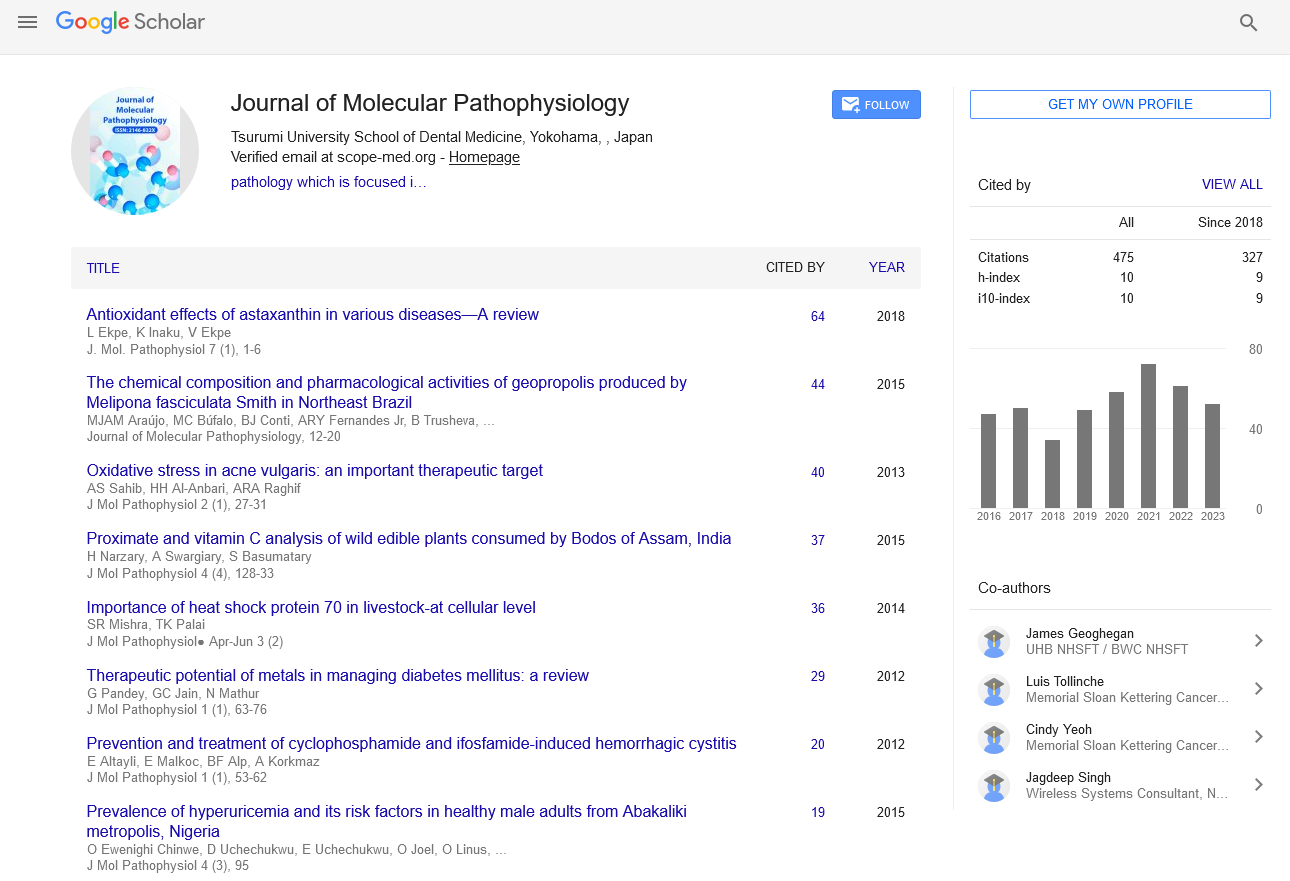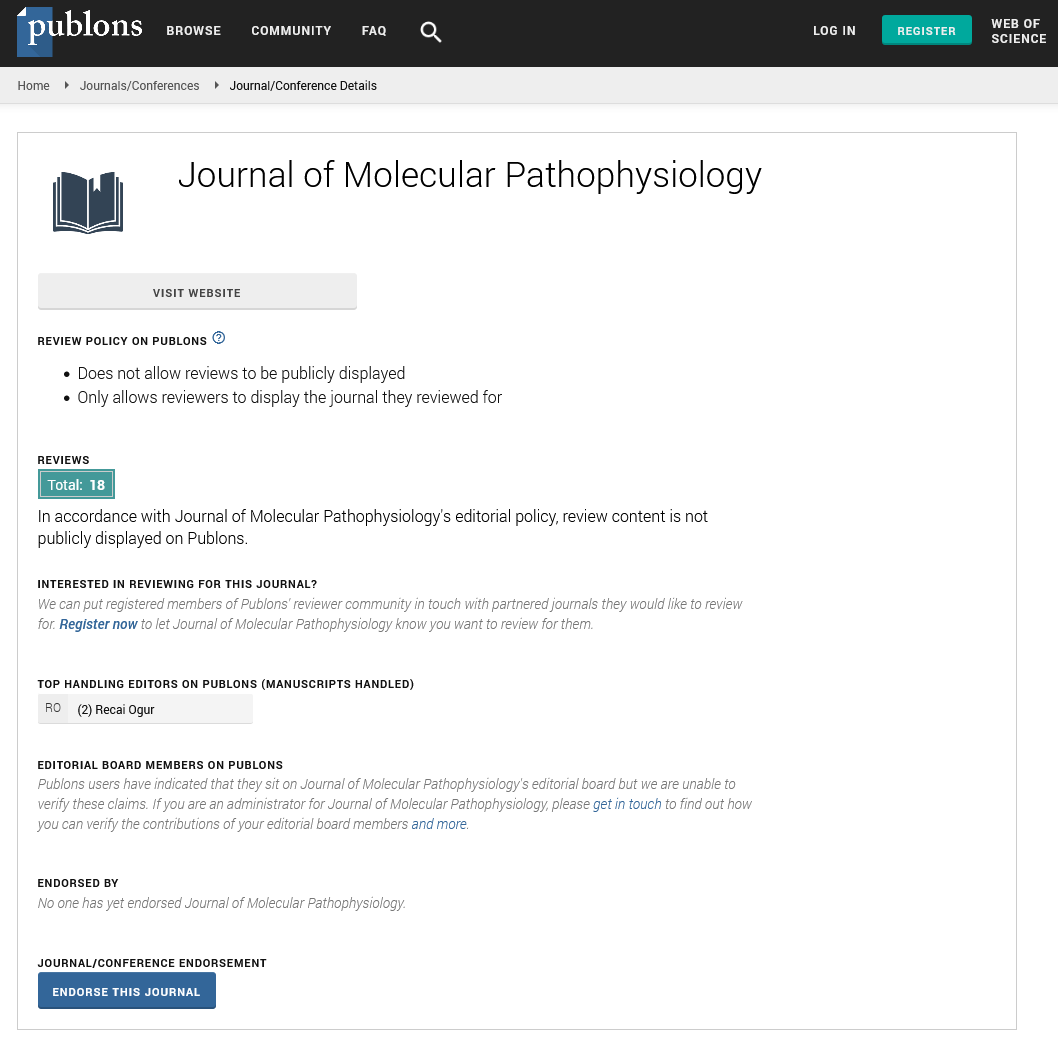Opinion Article - Journal of Molecular Pathophysiology (2024)
The Complexities and Role of Aberrant Signaling Pathways in Endocrine Dysfunction
Sophie Lohrey*Sophie Lohrey, Department of Endocrinology and Metabolism, University of Sydney, Sydney, Australia, Email: Lohrey1992@yahoo.com
Received: 25-Dec-2023, Manuscript No. JMOLPAT-24-126700; Editor assigned: 28-Dec-2023, Pre QC No. JMOLPAT-24-126700 (PQ); Reviewed: 12-Jan-2024, QC No. JMOLPAT-24-126700; Revised: 19-Jan-2024, Manuscript No. JMOLPAT-24-126700 (R); Published: 26-Jan-2024
About the Study
Endocrine disorders are a broad category of illnesses resulting from disruptions in the complex molecular processes that control the production, secretion, and function of hormones in the body. The endocrine system, comprising various glands and organs, coordinates the release of hormones to maintain homeostasis and coordinate physiological functions. Disruptions at the molecular level can lead to a spectrum of disorders, ranging from hormonal imbalances to severe metabolic dysregulation. One of the fundamental aspects of endocrine disorders lies in the malfunction of endocrine glands, such as the thyroid, pancreas, adrenal glands, and pituitary gland, among others. These glands play an important role in secreting hormones that influence various physiological processes.
The thyroid gland is crucial for regulating metabolism through the synthesis and secretion of thyroid hormones. Molecular abnormalities in the genes involved in thyroid hormone synthesis, such as thyroglobulin and thyroid peroxidase, can lead to conditions like congenital hypothyroidism. This condition causes difficulties in development and metabolism because malfunctioning thyroid hormone synthesis is impeded by compromised molecular pathways. Similarly, the pancreas, can be affected at the molecular level, leading to disorders like diabetes mellitus. In type 1 diabetes, an autoimmune response targets and destroys the insulin-producing beta cells in the pancreas. This autoimmune attack involves complex molecular pathways, including the activation of T cells and the release of proinflammatory cytokines. The intricate interplay of these molecular events ultimately disrupts insulin production and glucose regulation.
Cushing’s syndrome and Addison’s disease are two disorders that show the intricate molecular mechanisms behind endocrine dysfunction. Adrenal tumors are frequently the cause of Cushing’s syndrome, and abnormal adrenal cell proliferation is caused by molecular changes. This results in excessive cortisol production. Conversely, Addison’s disease results from the destruction of adrenal cortex cells, often prompted by autoimmune processes involving molecular interactions between immune cells and adrenal tissue.
The pituitary gland, often referred to as the “master gland” due to its central regulatory role, is susceptible to molecular aberrations leading to disorders like acromegaly or hypopituitarism. Excess growth hormone secretion, or amenomegaly, is frequently caused by pituitary adenomas with particular genetic abnormalities. Genetic abnormalities affecting different signaling pathways that occur at birth can cause hypopituitarism, which is characterized by impairments in the production of pituitary hormones. A significant role is also played by genetic mutations and molecular changes in illnesses affecting the parathyroid glands, which control calcium homeostasis. Genetic mutations affecting calcium-sensing receptors or other molecular components involved in parathyroid hormone control can cause primary hyperparathyroidism, which is defined by excessive parathyroid hormone output.
The molecular pathogenesis of endocrine disorders includes post-translational alterations, abnormal signaling pathways, and epigenetic modifications in addition to genetic mutations. Histone alterations and DNA methylation are examples of epigenetic modifications that can affect gene expression and play a role in endocrine disorders. For example, the pathophysiology of type 2 diabetes has been linked to altered DNA methylation patterns in the insulin gene promoter region.
Endocrine diseases are largely caused by aberrant signaling pathways, which involve substances such as growth factors, cytokines, and second messengers. Changes in signaling in response to insulin and other hormonal cues cause ovarian dysfunction, irregular menstruation, and metabolic problems in disorders such as Poly Cystic Ovary Syndrome (PCOS). Autoimmune processes contribute to several endocrine conditions, including type 1 diabetes, Hashimoto’s thyroiditis, and autoimmune adrenalitis. Molecular mimicry, where the immune system mistakenly targets endocrine tissues due to similarities between self-antigens and foreign antigens, underlies these autoimmune responses. Advancements in molecular biology techniques, such as next-generation sequencing, have facilitated the identification of novel genetic variants associated with endocrine disorders. Genome Wide Association Studies (GWAS) have uncovered common genetic markers linked to conditions like diabetes, providing valuable insights into the molecular basis of disease susceptibility.







